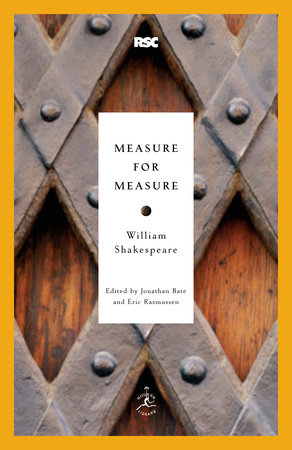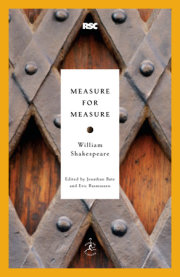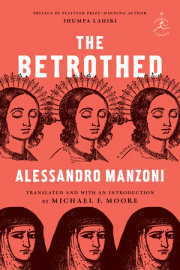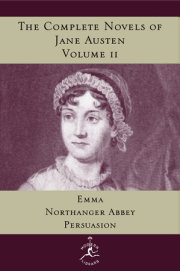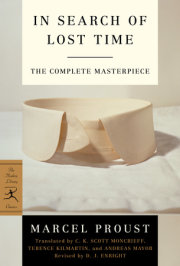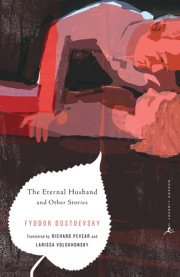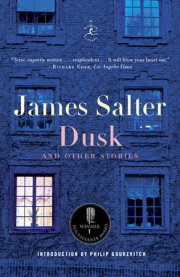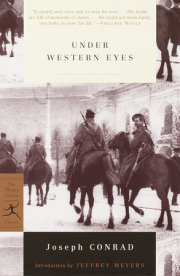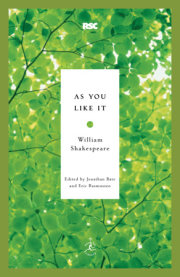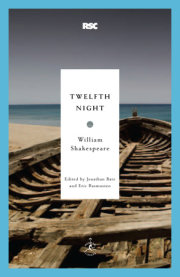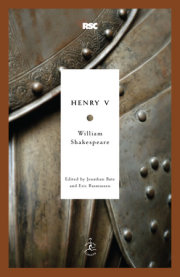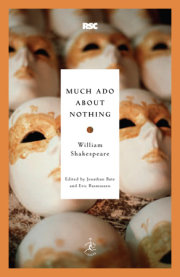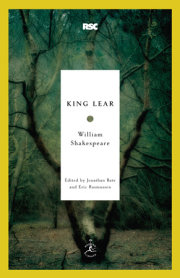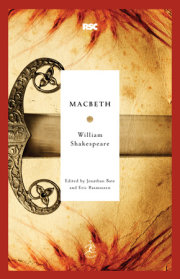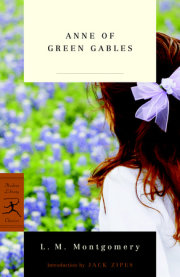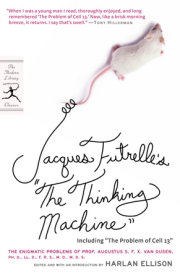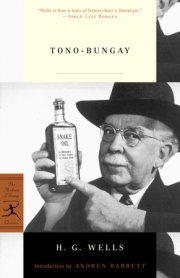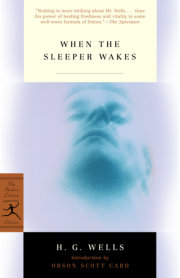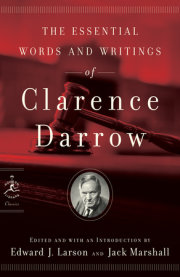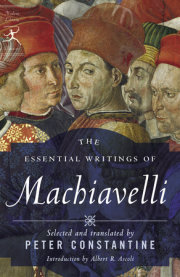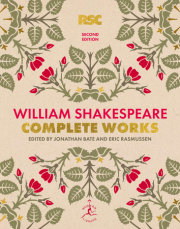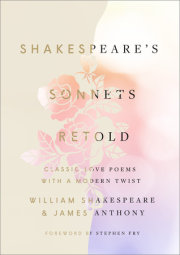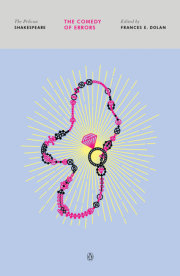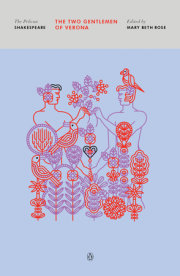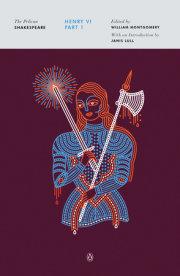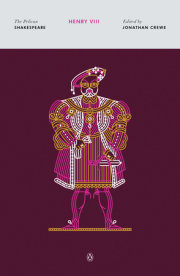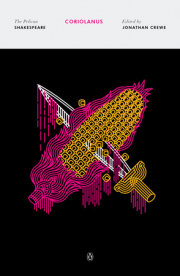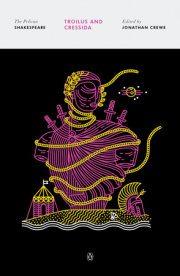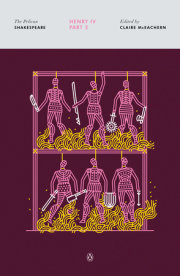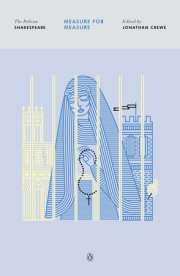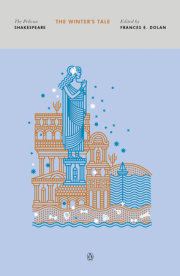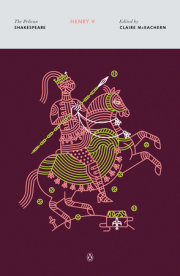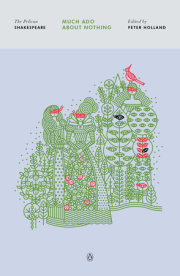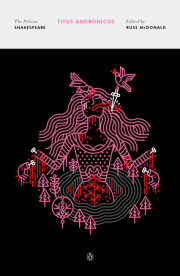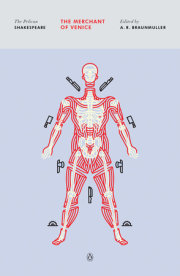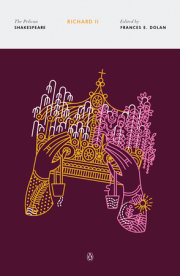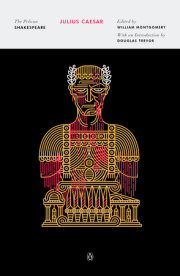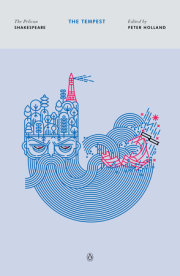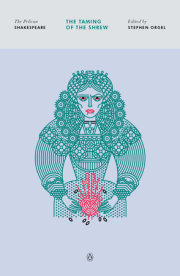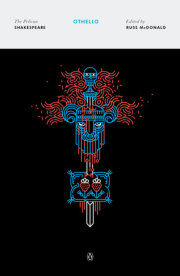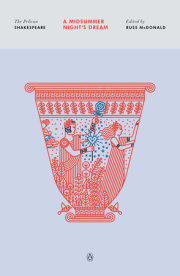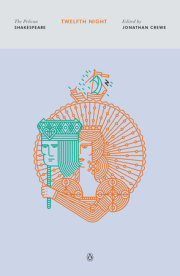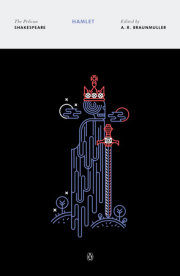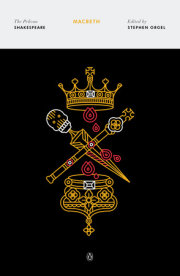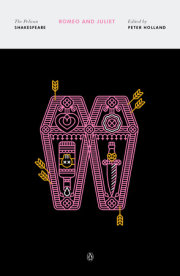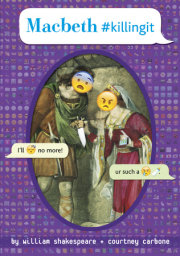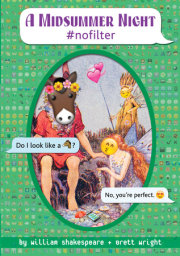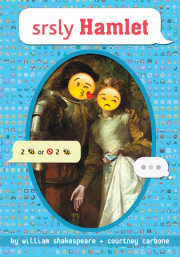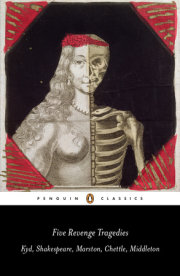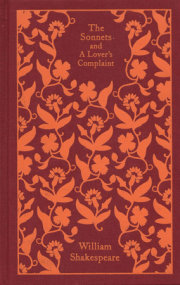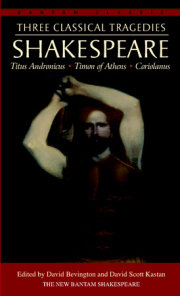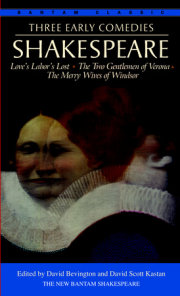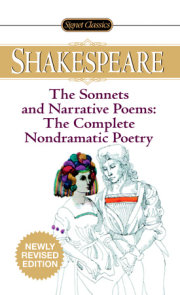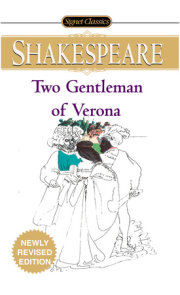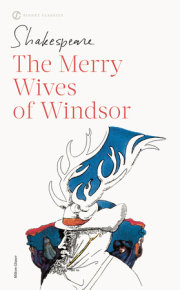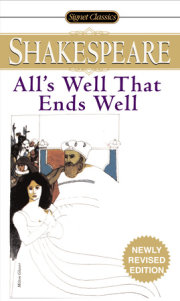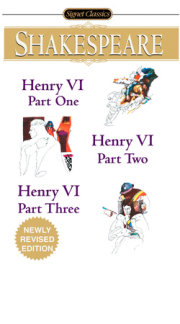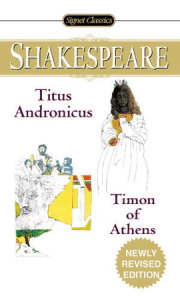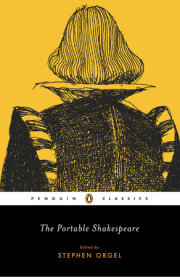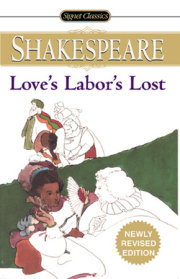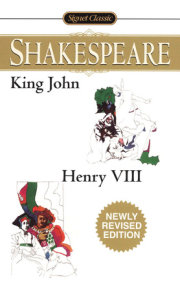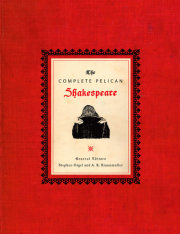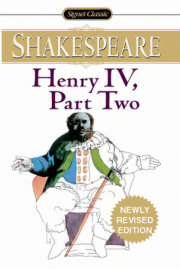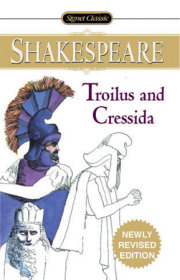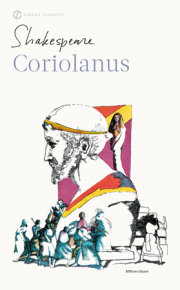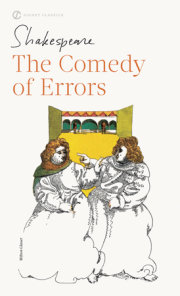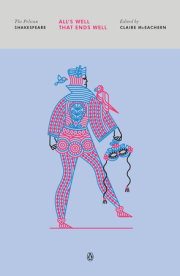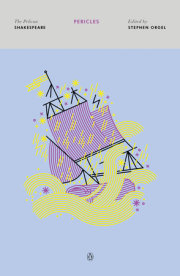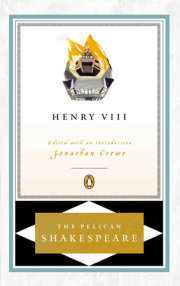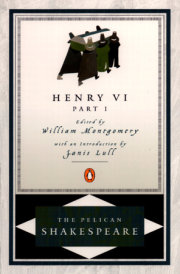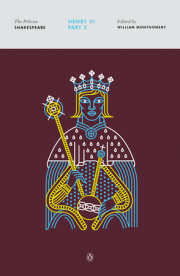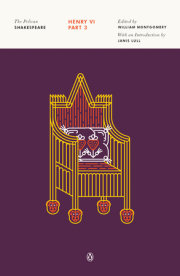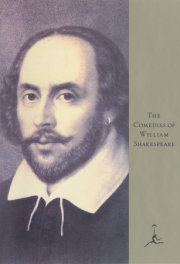Act 1 Scene 1 running scene 1
Enter Duke, Escalus, Lords [and Attendants]
DUKE Escalus.
ESCALUS My lord.
DUKE Of government the properties to unfold
Would seem in me t'affect speech and discourse,
Since I am put to know that your own science
Exceeds, in that, the lists of all advice
My strength can give you. Then no more remains
But that to your sufficiency as your worth is able,
And let them work. The nature of our people,
Our city's institutions, and the terms
For common justice, you're as pregnant in
As art and practice hath enrichèd any
That we remember. There is our commission, Hands him a paper
From which we would not have you warp. Call hither,
I say, bid come before us Angelo. [Exit an Attendant]
What figure of us think you he will bear?
For you must know, we have with special soul
Elected him our absence to supply;
Lent him our terror, dressed him with our love,
And given his deputation all the organs
Of our own power. What think you of it?
ESCALUS If any in Vienna be of worth
To undergo such ample grace and honour,
It is Lord Angelo.
DUKE Look where he comes.
Enter Angelo
ANGELO Always obedient to your grace's will,
I come to know your pleasure.
DUKE Angelo,
There is a kind of character in thy life
That to th'observer doth thy history
Fully unfold. Thyself and thy belongings
Are not thine own so proper as to waste
Thyself upon thy virtues, they on thee.
Heaven doth with us as we with torches do,
Not light them for themselves: for if our virtues
Did not go forth of us, 'twere all alike
As if we had them not. Spirits are not finely touched
But to fine issues, nor nature never lends
The smallest scruple of her excellence
But, like a thrifty goddess, she determines
Herself the glory of a creditor,
Both thanks and use. But I do bend my speech
To one that can my part in him advertise.
Hold therefore, Angelo.
In our remove be thou at full ourself:
Mortality and mercy in Vienna
Live in thy tongue and heart. Old Escalus,
Though first in question, is thy secondary.
Take thy commission. Offers a paper
ANGELO Now, good my lord,
Let there be some more test made of my mettle,
Before so noble and so great a figure
Be stamped upon it.
DUKE No more evasion.
We have with a leavened and preparèd choice
Proceeded to you: therefore take your honours. Angelo takes
Our haste from hence is of so quick condition paper
That it prefers itself and leaves unquestioned
Matters of needful value. We shall write to you,
As time and our concernings shall importune,
How it goes with us, and do look to know
What doth befall you here. So, fare you well:
To th'hopeful execution do I leave you
Of your commissions.
ANGELO Yet give leave, my lord,
That we may bring you something on the way.
DUKE My haste may not admit it,
Nor need you, on mine honour, have to do
With any scruple. Your scope is as mine own,
So to enforce or qualify the laws
As to your soul seems good. Give me your hand,
I'll privily away. I love the people,
But do not like to stage me to their eyes:
Though it do well, I do not relish well
Their loud applause and aves vehement,
Nor do I think the man of safe discretion
That does affect it. Once more, fare you well.
ANGELO The heavens give safety to your purposes!
ESCALUS Lead forth and bring you back in happiness!
DUKE I thank you. Fare you well. Exit
ESCALUS I shall desire you, sir, to give me leave
To have free speech with you; and it concerns me
To look into the bottom of my place.
A power I have, but of what strength and nature
I am not yet instructed.
ANGELO 'Tis so with me. Let us withdraw together,
And we may soon our satisfaction have
Touching that point.
ESCALUS I'll wait upon your honour. Exeunt
Act 1 Scene 2 running scene 2
Enter Lucio and two other Gentlemen
LUCIO If the duke with the other dukes come not to composition with the King of Hungary, why then all the dukes fall upon the king.
FIRST GENTLEMAN Heaven grant us its peace, but not the King of Hungary's!
SECOND GENTLEMAN Amen.
LUCIO Thou concludest like the sanctimonious pirate, that went to sea with the Ten Commandments, but scraped one out of the table.
SECOND GENTLEMAN 'Thou shalt not steal'?
LUCIO Ay, that he razed.
FIRST GENTLEMAN Why, 'twas a commandment to command the captain and all the rest from their functions: they put forth to steal. There's not a soldier of us all that, in the thanksgiving before meat, do relish the petition well that prays for peace.
SECOND GENTLEMAN I never heard any soldier dislike it.
LUCIO I believe thee; for I think thou never wast where grace was said.
SECOND GENTLEMAN No? A dozen times at least.
FIRST GENTLEMAN What, in metre?
LUCIO In any proportion or in any language.
FIRST GENTLEMAN I think, or in any religion.
LUCIO Ay, why not? Grace is grace, despite of all controversy: as for example, thou thyself art a wicked villain, despite of all grace.
FIRST GENTLEMAN Well, there went but a pair of shears between us.
LUCIO I grant, as there may between the lists and the velvet. Thou art the list.
FIRST GENTLEMAN And thou the velvet. Thou art good velvet; thou'rt a three-piled piece, I warrant thee. I had as lief be a list of an English kersey as be piled, as thou art piled, for a French velvet. Do I speak feelingly now?
LUCIO I think thou dost, and indeed, with most painful feeling of thy speech. I will, out of thine own confession, learn to begin thy health, but, whilst I live, forget to drink after thee.
FIRST GENTLEMAN I think I have done myself wrong, have I not?
SECOND GENTLEMAN Yes, that thou hast, whether thou art tainted or free.
Enter Bawd [Mistress Overdone]
LUCIO Behold, behold, where Madam Mitigation comes! I have purchased as many diseases under her roof as come to-
SECOND GENTLEMAN To what, I pray?
LUCIO Judge.
SECOND GENTLEMAN To three thousand dolours a year.
FIRST GENTLEMAN Ay, and more.
LUCIO A French crown more.
FIRST GENTLEMAN Thou art always figuring diseases in me, but thou art full of error, I am sound.
LUCIO Nay, not as one would say, healthy: but so sound as things that are hollow; thy bones are hollow, impiety has made a feast of thee.
FIRST GENTLEMAN How now! Which of your To Mistress Overdone
hips has the most profound sciatica?
MISTRESS OVERDONE Well, well. There's one yonder arrested and carried to prison was worth five thousand of you all.
SECOND GENTLEMAN Who's that, I pray thee?
MISTRESS OVERDONE Marry, sir, that's Claudio, Signior Claudio.
FIRST GENTLEMAN Claudio to prison? 'Tis not so.
MISTRESS OVERDONE Nay, but I know 'tis so. I saw him arrested, saw him carried away, and, which is more, within these three days his head to be chopped off.
LUCIO But, after all this fooling, I would not have it so. Art thou sure of this?
MISTRESS OVERDONE I am too sure of it. And it is for getting Madam Julietta with child.
LUCIO Believe me, this may be: he promised to meet me two hours since, and he was ever precise in promise-keeping.
SECOND GENTLEMAN Besides, you know, it draws something near to the speech we had to such a purpose.
FIRST GENTLEMAN But most of all agreeing with the proclamation.
LUCIO Away! Let's go learn the truth of it.
Exeunt [Lucio and Gentlemen]
MISTRESS OVERDONE Thus, what with the war, what with the sweat, what with the gallows and what with poverty, I am custom-shrunk.
Enter Clown [Pompey]
How now? What's the news with you?
POMPEY Yonder man is carried to prison.
MISTRESS OVERDONE Well, what has he done?
POMPEY A woman.
MISTRESS OVERDONE But what's his offence?
POMPEY Groping for trouts in a peculiar river.
MISTRESS OVERDONE What, is there a maid with child by him?
POMPEY No, but there's a woman with maid by him. You have not heard of the proclamation, have you?
MISTRESS OVERDONE What proclamation, man?
POMPEY All houses in the suburbs of Vienna must be plucked down.
MISTRESS OVERDONE And what shall become of those in the city?
POMPEY They shall stand for seed: they had gone down too, but that a wise burgher put in for them.
MISTRESS OVERDONE But shall all our houses of resort in the suburbs be pulled down?
POMPEY To the ground, mistress.
MISTRESS OVERDONE Why, here's a change indeed in the commonwealth! What shall become of me?
POMPEY Come, fear you not: good counsellors lack no clients. Though you change your place, you need not change your trade: I'll be your tapster still. Courage! There will be pity taken on you; you that have worn your eyes almost out in the service, you will be considered.
MISTRESS OVERDONE What's to do here, Thomas tapster? Let's withdraw.
POMPEY Here comes Signior Claudio, led by the provost to prison, and there's Madam Juliet. Exeunt
Act 1 Scene 3 running scene 2 continues
Enter Provost, Claudio, Juliet, Officers; Lucio and the two Gentlemen [follow]
CLAUDIO Fellow, why dost thou show me thus to th'world?
Bear me to prison, where I am committed.
PROVOST I do it not in evil disposition,
But from Lord Angelo by special charge.
CLAUDIO Thus can the demigod Authority
Make us pay down for our offence by weight
The words of heaven; on whom it will, it will,
On whom it will not, so. Yet still 'tis just.
LUCIO Why, how now, Claudio? Whence comes this restraint?
CLAUDIO From too much liberty, my Lucio, liberty:
As surfeit is the father of much fast,
So every scope by the immoderate use
Turns to restraint. Our natures do pursue,
Like rats that ravin down their proper bane,
A thirsty evil, and when we drink we die.
LUCIO If I could speak so wisely under an arrest, I would send for certain of my creditors: and yet, to say the truth, I had as lief have the foppery of freedom as the morality of imprisonment. What's thy offence, Claudio?
CLAUDIO What but to speak of would offend again.
LUCIO What, is't murder?
CLAUDIO No.
LUCIO Lechery?
CLAUDIO Call it so.
PROVOST Away, sir. You must go.
CLAUDIO One word, good friend. Lucio, a word with you.
LUCIO A hundred, if they'll do you any good.
Is lechery so looked after?
CLAUDIO Thus stands it with me: upon a true contract
I got possession of Julietta's bed.
You know the lady, she is fast my wife,
Save that we do the denunciation lack
Of outward order. This we came not to
Only for propagation of a dower
Remaining in the coffer of her friends,
From whom we thought it meet to hide our love
Till time had made them for us. But it chances
The stealth of our most mutual entertainment
With character too gross is writ on Juliet.
LUCIO With child, perhaps?
CLAUDIO Unhappily, even so.
And the new deputy now for the duke -
Whether it be the fault and glimpse of newness,
Or whether that the body public be
A horse whereon the governor doth ride,
Who, newly in the seat, that it may know
He can command, lets it straight feel the spur:
Whether the tyranny be in his place,
Or in his eminence that fills it up,
I stagger in - but this new governor
Awakes me all the enrollèd penalties
Which have, like unscoured armour, hung by th'wall
So long that nineteen zodiacs have gone round
And none of them been worn; and, for a name,
Now puts the drowsy and neglected act
Freshly on me. 'Tis surely for a name.
LUCIO I warrant it is: and thy head stands so tickle on thy shoulders that a milkmaid, if she be in love, may sigh it off. Send after the duke and appeal to him.
CLAUDIO I have done so, but he's not to be found.
I prithee, Lucio, do me this kind service:
This day my sister should the cloister enter
And there receive her approbation.
Acquaint her with the danger of my state,
Implore her, in my voice, that she make friends
To the strict deputy: bid herself assay him.
I have great hope in that, for in her youth
There is a prone and speechless dialect,
Such as move men. Beside, she hath prosperous art
When she will play with reason and discourse,
And well she can persuade.
LUCIO I pray she may; as well for the encouragement of the like, which else would stand under grievous imposition, as for the enjoying of thy life, who I would be sorry should be thus foolishly lost at a game of tick-tack. I'll to her.
CLAUDIO I thank you, good friend Lucio.
LUCIO Within two hours.
CLAUDIO Come, officer, away! Exeunt
Act 1 Scene 4 running scene 3
Enter Duke and Friar Thomas
DUKE No, holy father, throw away that thought:
Believe not that the dribbling dart of love
Can pierce a complete bosom. Why I desire thee
To give me secret harbour hath a purpose
More grave and wrinkled than the aims and ends
Of burning youth.
FRIAR THOMAS May your grace speak of it?
DUKE My holy sir, none better knows than you
How I have ever loved the life removed,
And held in idle price to haunt assemblies
Where youth and cost and witless bravery keeps.
I have delivered to Lord Angelo -
A man of stricture and firm abstinence -
My absolute power and place here in Vienna,
And he supposes me travelled to Poland,
For so I have strewed it in the common ear,
And so it is received. Now, pious sir,
You will demand of me why I do this.
FRIAR THOMAS Gladly, my lord.
DUKE We have strict statutes and most biting laws,
The needful bits and curbs to headstrong weeds,
Which for this fourteen years we have let slip,
Even like an o'ergrown lion in a cave
That goes not out to prey. Now, as fond fathers,
Having bound up the threat'ning twigs of birch,
Only to stick it in their children's sight
For terror, not to use, in time the rod
Becomes more mocked than feared: so our decrees,
Dead to infliction, to themselves are dead,
And liberty plucks justice by the nose,
The baby beats the nurse, and quite athwart
Goes all decorum.
FRIAR THOMAS It rested in your grace
To unloose this tied-up justice when you pleased:
And it in you more dreadful would have seemed
Than in Lord Angelo.
DUKE I do fear, too dreadful.
Sith 'twas my fault to give the people scope,
'Twould be my tyranny to strike and gall them
For what I bid them do, for we bid this be done,
When evil deeds have their permissive pass
And not the punishment. Therefore indeed, my father,
I have on Angelo imposed the office,
Who may in th'ambush of my name strike home,
And yet my nature never in the fight
To do in slander. And to behold his sway,
I will, as 'twere a brother of your order,
Visit both prince and people: therefore, I prithee,
Supply me with the habit and instruct me
How I may formally in person bear me
Like a true friar. More reasons for this action
At our more leisure shall I render you;
Only, this one: Lord Angelo is precise,
Stands at a guard with envy, scarce confesses
That his blood flows, or that his appetite
Is more to bread than stone. Hence shall we see,
If power change purpose, what our seemers be. Exeunt
Copyright © 2010 by William Shakespeare. All rights reserved. No part of this excerpt may be reproduced or reprinted without permission in writing from the publisher.

